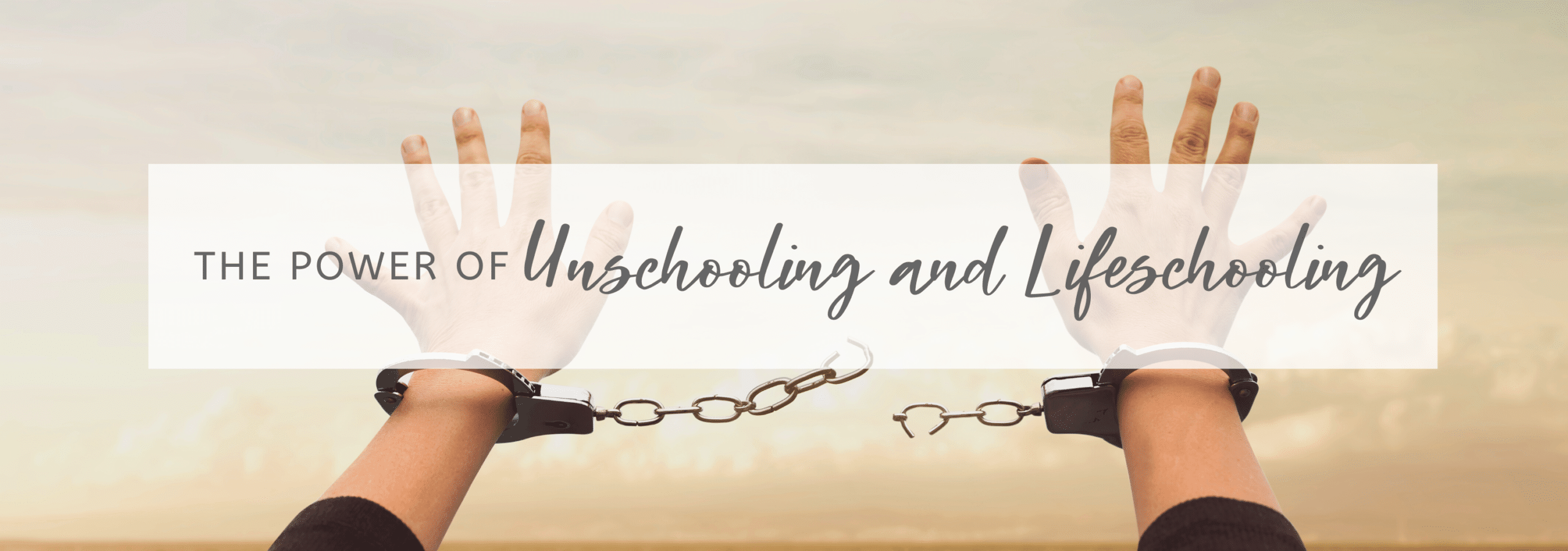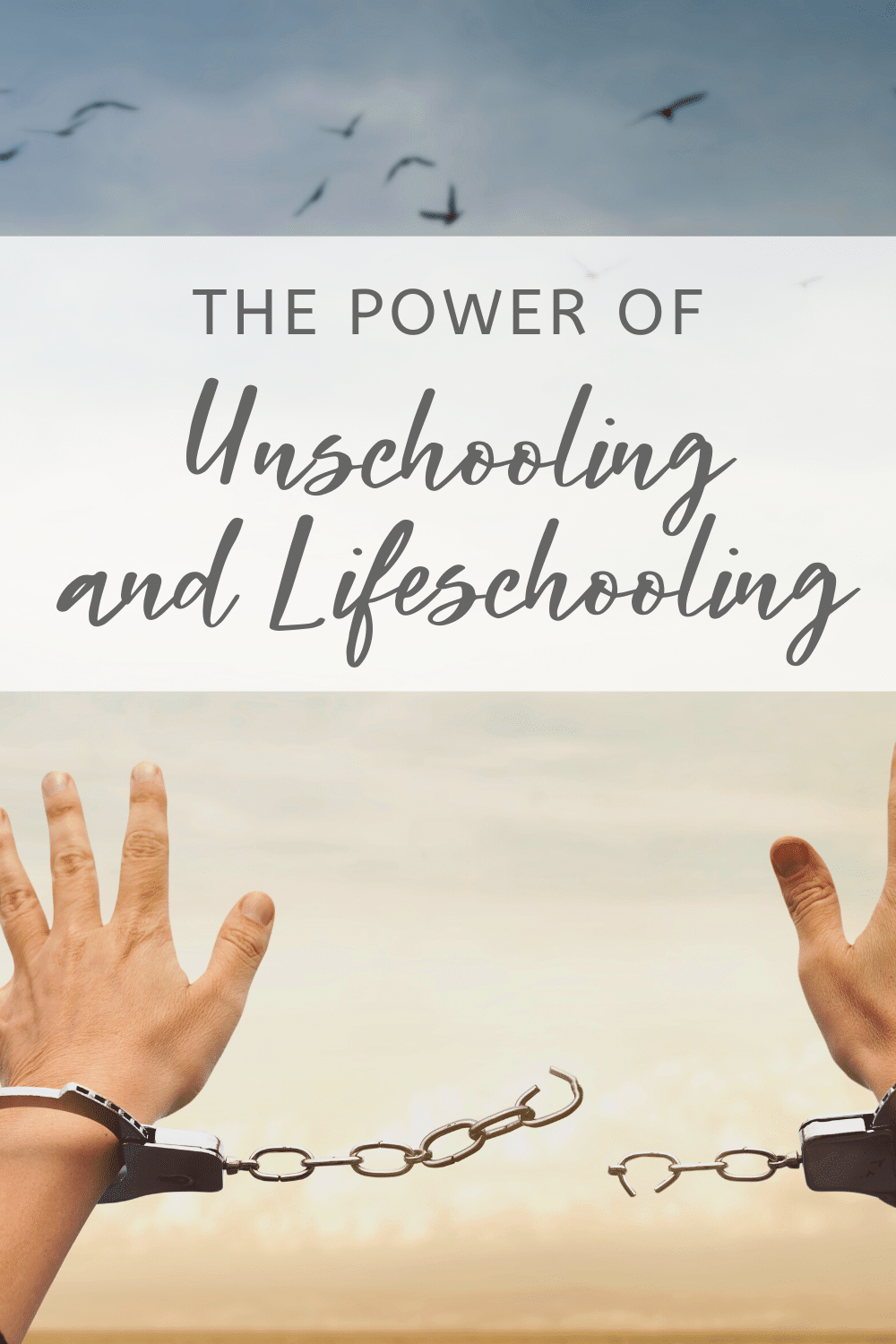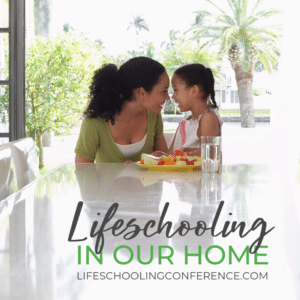The Power of Unschooling (and Lifeschooling): Nurturing Self-Directed Learners
Did you know that the traditional education system, despite its supposed advancements, may only cater to some learners’ diverse needs? Shocker, I know. 😉 But that is probably why many discerning parents are resorting to alternative methods of educating their children. According to Health Research Funding, 2.9% of the students in the United States do not attend traditional schooling.
That’s a huge percentage, and it seems to only be growing, especially since COVID. Homeschooling has exploded, and many families have experienced the benefits.
But many of those families are still not seeing the full benefits, due to bringing those traditional schooling methods into their homes and adopting a “school-at-home” approach.
So what is the alternative? One option is unschooling.
While traditional schooling follows a structured curriculum, unschooling advocates for a more flexible, learner-centric approach. Unschooling families believe children learn best when motivated by their interests and curiosity.
In this article, we will delve into the transformative potential of unschooling, exploring how it nurtures self-directed learners and revolutionizes how we think about education. And then we’ll talk about something I like to call “lifeschooling,” which is a similar method with a Christian foundation and focus. (This is why I personally don’t prefer the term “unschooling,” since it does not fully encapsulate the philosophy of lifeschooling, with it’s Christian foundation and emphasis).
Understanding Unschooling
Unschooling, at its core, is a form of alternative education that prioritizes self-directed learning over traditional classroom instruction. This approach emphasizes the individual’s natural curiosity and exploration, allowing learners to pursue their interests and passions autonomously. The fundamental principle lies in the belief that meaningful learning occurs when it aligns with an individual’s intrinsic motivation.
Think about it this way: Before a child even enters school, they learn an immense amount of information…how to understand and communicate in their native language, how to walk, how to manipulate toys and other things in their world, and the list goes on. And why do they learn all this? Because of natural curiosity and motivation. It’s really mind-blowing when you think about it!
The unschooling movement started in the early 20th century when educational reformers like John Holt questioned the traditional school model (which, by the way, was designed by leaders in the industrial revolution, who wanted to raise up a work force…but that’s a story for another day). These educational reformers challenged the traditional education system, advocating for a more individualized and learner-centric approach.
One can also see the philosophies of Jean Jacques Rousseau and other forerunners in much of the unschooling philosophy. Rousseau, who had a huge influence in the French Revolution, believed in a form of education that was child-directed. Though he claimed to be a Christian, he rejected the doctrine of original sin, believing children were pure from birth, but corrupted by civilization. He is credited with the concept of the “noble savage,” believing that people were more “pure” without the restraints and structures of civilization and government. Perhaps this accounts for his view that true followers of Christ would not make good citizens.
Over the years, unschooling has evolved and gained recognition as a viable alternative to conventional schooling. Unlike traditional education, which follows a structured curriculum and standardized assessments, unschooling takes a more personalized approach. There are no formal classrooms, rigid schedules, or standardized tests. Children are free to learn at their own pace and in their own way.
It rejects the notion of a one-size-fits-all curriculum. Instead, it promotes the belief that individuals learn best when engaging in topics that resonate with them. Freedom is a core value, as with lifeschooling, but one must recognize the basic premise of the type of freedom that unschooling promotes. The child is considered the ultimate authority.
Key Elements of Unschooling
Child-Led Learning and Autonomy
Unschooling is a child-led approach to education, meaning children control their learning. The children choose what they want to learn, how they want to learn it, and when they want to learn it.
Intrinsic motivation is the driving force behind the success of unschooling. Unlike external rewards or grades, unschooling relies on tapping into a child’s innate curiosity and self-motivation. This type of motivation is more sustainable than external motivation, such as grades or rewards.
Personalized Education
Whether a child is a visual, auditory, or kinesthetic learner, unschooling recognizes and tailors the learning experience to suit their unique preferences. This flexibility ensures that education becomes a personalized, enriching journey, maximizing the potential for understanding and retention. Unschoolers learn through curiosity and interest in the subjects they study.
Brace yourselves, Type A moms…there is no set curriculum or schedule. Instead, children can learn at their own pace and in their own way. Some children learn best by reading, while others learn best by doing. And it is completely up to the child to choose.
Learning Through Experience
Unschooling places a profound emphasis on learning through real-world experiences and hands-on activities. We’ve probably all intuitively noticed how much more we seem to learn when we are actively involved in a project or activity. The departure from abstract theoretical concepts to tangible, practical applications allows children to grasp knowledge meaningfully. Children are given opportunities to participate in various activities, such as traveling, volunteering, and taking classes.
Unschooling in Practice
Mornings may not follow a traditional school bell schedule, as unschooling families often prioritize flexibility. There is no set schedule or curriculum. Some unschooling families spend their days traveling, volunteering, and taking classes. Others spend their days at home reading, playing, and working on projects.
Parents or guardians may provide resources and support, but they do not dictate what their children learn or how they learn it. That would go against the underlying philosophy of unschooling, which is that the child knows best.
There are no prescribed textbooks or standardized tests. This lack of a fixed curriculum liberates learners from the constraints of a one-size-fits-all approach, fostering a genuine love for learning and encouraging exploration beyond the boundaries of conventional subjects.
Rather than adopting a traditional teaching role, parents and guardians act as guides, observing and understanding their children’s interests, strengths, and challenges. This parental role facilitates learning opportunities by providing access to resources, answering questions, and connecting their children with mentors or experts in various fields.
Benefits of Unschooling
The lifelong benefits of unschooling extend far beyond the realm of traditional education. This approach promotes creativity, critical thinking, and problem-solving skills, laying the foundation for a resilient and versatile mindset that serves individuals well in their personal and professional endeavors.
In a study, 83% of unschooling students pursue higher education. (Yes, you can go to college if you unschool!) Some continue their studies to earn a bachelor’s degree from an accredited university. Examples of famous unschooled individuals are Billie Eilish, Jaden Smith, and Serena and Vanessa Williams. Celebrity parents like Adele and Alanis Morissette also considered unschooling their children.
Contrary to common misconceptions, unschooled children have ample opportunities for socialization. Unschooling communities often organize gatherings, co-op classes, and social events, creating a supportive network for children and parents. They may also socialize with other children through online forums and support groups.
Challenges and Concerns
1. Lack of Structure
One common concern is the perceived need for more structure, with critics questioning whether unschooled children receive a well-rounded education. Additionally, concerns may arise about potential gaps in knowledge, especially in subjects that are traditionally part of a standard curriculum. Some also raise concerns about their future educational and career paths.
These are fair concerns, particularly considering the underlying philosophy of unschooling, which is a belief that the child always knows best and should be completely free to choose his/her own path. As Christians, we know that children are immature and do not have the wisdom their parents and other adults have. Freedom and autonomy are important, but should not become the idol to which we sacrifice common sense and biblical wisdom.
With lifeschooling, there is a focus on God as the giver of our child’s gifts and parents not just as somewhat passive guides, but as those responsible for stepping in and redirecting or even forcing learning when led by God to do so. The child is under the wise, biblical authority of the parent and, while his freedom and autonomy is respected, he is not the one with ultimate control (and responsibility) of the learning.
Simply put, “with great freedom comes great responsibility.” (Thank you, Spiderman.) And children are just not mature or wise enough to have that kind of heavy burden put upon them. It is our job as parents to put a proverbial “fence” around their freedom and keep it within certain bounds.
That being said, the lifeschooling philosophy still puts a great emphasis on allowing children to pursue their own interests and respecting their natural curiosity and love for learning. Forced learning should be minimal, and not done out of “fear of gaps.” God fills in the gaps when we follow His direction, and that direction will not look identical (far from it!) for each child, given their unique giftings and abilities.
2. Lack of Socialization
Another criticism centers on socialization, with some expressing apprehension that unschooled children may miss out on the social skills developed in a traditional school setting. Critics fear that the absence of a structured environment might hinder the development of teamwork, conflict resolution, and other interpersonal skills vital for navigating the complexities of adult life.
As most homeschoolers know, this is a ridiculous concern. The idea that children need to be around other children their own age for such a large portion of the day is a modern idea and completely different from family life and what they will experience in the “real world” when they graduate and join the work force. Being confined to only one’s peer group actually has a negative effect, stunting maturity by limiting access to older, wiser peers and adults from whom they can learn and emulate.
With lifeschooling particularly, there is a focus on finding mentors for our children who love God and can help our children grow in their gifts. This benefits the child both practically and spiritually, helping them to not only grow in their abilities and emotional maturity, but also their walk with God and greater sense of meaningful purpose for their gifts.
3. Lack of Conventional Assessment
The biggest concern about unschooling is the unconventional assessment. Parents only rely on observing their children’s progress and talking to them about their learning.
However, one way is to create a personalized learning plan (PLP) for each child, to use the “school jargon.” Personally, I shy away from the methods and language used in traditional schooling, but a PLP is simply a document that outlines a child’s learning goals and how they plan to achieve them. Parents can use PLPs to assess a child’s progress and ensure they are on track to meet their goals, and it doesn’t have to be a complex document. (The Lifeschooling Vision Planner is an ideal planner to provide a little more guidance for an unschooler or lifeschooler).
Ultimately, parents are the best assessors of their child’s abilities and progress simply by observation. As lifeschooling Christians, we focus more on the aspect of faith in God to bring the right opportunities and connections as we pray through and document our children’s educational journey. Faith in God and a focus on “seeking first the Kingdom and His righteousness (Mt. 6:33) is the underlying foundational difference between unschooling and lifeschooling. And prayer (simply asking God for guidance and listening to what He says) is the cornerstone on which that faith rests.
Legal and Practical Considerations
The legal requirements and regulations related to unschooling vary from region to region. In some regions, unschooling is fully legal and unregulated. In other regions, unschooling is legal but subject to specific regulations, such as requiring parents to notify the government or to have their children’s progress assessed by a qualified professional. And in still other regions, unschooling is illegal altogether.
Before embarking on an unschooling (or lifeschooling) journey, parents should thoroughly research and understand the legal requirements relevant to homeschooling in the specific jurisdiction. It may involve consulting local education departments, school boards, or homeschooling associations to ensure compliance with applicable laws.
There are several resources and support networks available to unschooling and lifeschooling families. Homeschool support groups provide a forum for unschooling or lifeschooling families to connect, share resources, and get support. Local meet-ups and social media groups also provide platforms for parents and guardians to connect with others with similar educational philosophies.
Conclusion
Unschooling allows children to develop the skills and knowledge they need to be successful self-directed learners. This learner-centric model emphasizes intrinsic motivation, fostering creativity, critical thinking, and adaptability—the essential skills needed to thrive in an ever-evolving world. Students learn to set and develop plans for achieving their learning goals.
Lifeschooling offers an even better alternative to Christian homeschooling parents who may be drawn to the many benefits of unschooling, but sense these foundational problems I’ve mentioned and want the philosophy they embrace to be based upon a Christian worldview.
For parents who consider this alternative education model, you should delve into the rich resources available, connect with homeschool support groups, and engage in discussions with those who have firsthand experience with unschooling or lifeschooling. Understanding unschooling’s (and lifeschoolings’s) legal requirements, benefits, and challenges will allow you to make informed choices aligned with your children’s unique needs and interests.
Frequently Asked Questions
Can I combine unschooling or lifeschooling with other educational approaches or methods?
Absolutely. Combining unschooling or lifeschooling with other educational approaches is possible and often called “eclectic homeschooling.” This approach allows for a tailored blend of unschooling principles with elements from other educational methods. This approach is how the lifeschooling philosophy was developed.
Can a Christian be an unschooler?
Yes and no. There are many homeschoolers who would label themselves as unschoolers, but would probably fit better under the label of “lifeschooler.” There is a subtle worldview in unschooling of “the child knows best” that can easily slip into our thinking if we are not careful. It is best to align yourself with a philosophy that puts God at the center and has a bibilical worldview at its foundation, and with groups of likeminded individuals who will support and encourage you.
What should I consider when transitioning from traditional schooling to unschooling or lifeschooling?
It is important to start transitioning to unschooling or lifeschooling slowly. Talk to your child about their interests and what they want to learn. Communicating with your child will help you tailor your approach to unschooling or lifeschooling to their needs. Some children actually crave direction and structure, especially those who have grown up in traditional school. A few worksheets or structured classes won’t hurt them!
How do unschooled or lifeschooled children learn without a structured curriculum?
The interests of unschooled or lifeschooled children become the focal point of their education, driving them to explore, ask questions, and seek knowledge. In today’s world, we have information at our fingertips and research is simple! Additionally, project-based learning fosters in-depth exploration and skill development.
Lifeschooling puts more focus on parental guidance and intervention, recognizing that the parent knows best. As much freedom is given as possible, with the parents seeking God in how they direct their children’s exploration of topics and interests. This can include some curriculum when it seems to fit well with the child’s learning style and interests.
- The Book Writing Process: 5 Essential Tips (Plus a few more) - June 26, 2025
- Inspirational Missionary Stories for your Homeschool - March 5, 2025
- Tips for Building Healthy Relationships - February 17, 2025





2 Comments
This article was wonderful and very informative. I am considering taking my daughter out of the school system and have been very interested in the unschooling or life schooling. I’m still doing research but am also confused about how it works. Thank you very much for sone information in this article.
I’m so glad it was helpful! Lifeschooling is such a gift and you will never regret being with your child as they grow up. I hope you find lots of helpful info on this site as you continue to learn! Feel free to comment on any of the posts and ask questions.